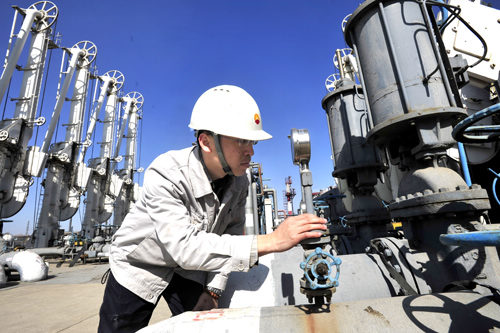|
 |
|
PROFITABLE OIL GIANT: A worker of PetroChina Co. Ltd. checks pipelines running through Dalian, Liaoning Province (MA YIDONG) |
By October 31, most of the companies listed in China's A-share market had published their performance for the third quarter. Reports or corporate announcements show that in the third quarter, performances of these companies across the board were less than favorable. Now, people are concerned that the real economy will also slump and, if the downturn is not changed, will impose an adverse impact to the Chinese and world economy.
According to quarterly report figures, the 2,304 companies trading stocks in China's A-share market generated aggregate sales revenue of 15.99 trillion yuan ($2.53 trillion) in the first nine months of 2011, up 24.94 percent compared with the same period last year. During the same period, they reported net profits of 1.49 trillion yuan ($235.76 billion), a year-on-year increase of 18.76 percent, which was a decline of 3.59 percentage points from that in the semi-annual reports. The drop mainly came from the third quarter, when the net profits of listed companies decreased by 6.12 percent to 479.62 billion yuan ($75.89 billion) from 510.97 billion yuan ($80.85 billion) in the second quarter.
Chen Hualiang, an analyst at CITIC Securities Co. Ltd., said profit growth of A-share listed companies, both in the single third quarter and for the first three quarters, is lower than market expectations.
Industries of transportation, ferrous metals and public utilities reported major declines, particularly segmented industries of water transportation, iron and steel and power. Since iron and steel and power industries are in the upstream of the industrial chains, declines in these industries may indicate China's industrial vigor is weakening. However, Zhang Xinhong, an analyst at China Securities Co. Ltd., said pessimism isn't necessary since the decline almost corresponded to the track of macroeconomic operations.
"The loss on exchange is the major reason for cash losses by listed companies in the third quarter," said Zhang Haigang, an account manager of CITIC Securities Co. Ltd.
From June 19, 2010, when China's central bank went ahead with reforming the yuan exchange rate regime, to the end of the third quarter this year, the yuan appreciated by 7.3 percent against the U.S. dollar. The appreciation is particularly steep in the third quarter, reaching 1.76 percent. In this quarter 1,200 listed companies lost 25 billion yuan ($3.96 billion) due to the exchange rate fluctuations.
PetroChina was most affected by the changes, losing 679 million yuan ($107.44 million). ZTE Corp. lost 266 million yuan ($42.09 million) during the first three quarters, compared with 26 million yuan ($4.11 million) last year, pulling the company's net profits down by 21 percent in the third quarter.
The yuan's appreciation also increased financial expenses for ZTE. In the third quarter the company reported 1.02 billion yuan ($161.39 million) of financial expenses, a year-on-year increase of 1,068 percent.
Financial expenses mainly include net interest expenses, exchange gains or losses, and service charges paid to financial institutions. In the third quarter, the 2,304 listed companies reported aggregate financial expenses of 139.9 billion yuan ($22.14 billion), up 27.8 percent from last year.
"The high financial expenses have become an arduous task in front of numerous listed companies. When they issue their annual reports for 2011, the impact of the yuan's appreciation will be more common and serious," said Zhang.
According to the quarterly reports, excluding listed financial companies, companies issuing A-shares had a total cash flow of 133.6 billion yuan ($21.14 billion), a drop of 63.27 percent from the figure of $363.7 billion yuan ($57.54 percent) during the same period last year. Of this, 1,261 companies, or 60 percent, had negative cash flows, against the figure of less than 1,000 in the same period last year.
Zhang said this indicates cash flows of listed companies continue to worsen. As the government tightens control over bank loans, trickling cash flows will make it more difficult for the companies to maintain business growth.
|
